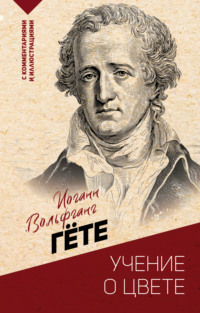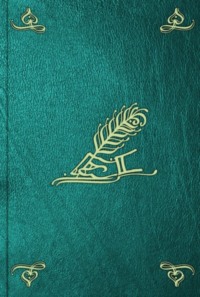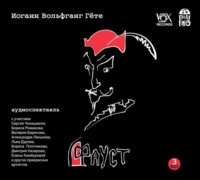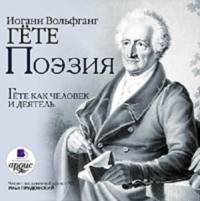 полная версия
полная версияThe Autobiography of Goethe
Among the captives, despoiled and dragged along with their property, is Lot, who shares the fate of the country in which he lives a guest. Abraham learns this, and here at once we behold the patriarch a warrior and hero. He gathers together his servants, divides them into troops, attacks and falls upon the luggage of booty, confuses the victors, who could not suspect another enemy in the rear, and brings back his brother and his goods, with a great deal more belonging to the conquered kings. Abraham, by means of this brief contest, acquires, as it were, the whole land. To the inhabitants he appears as a protector, saviour, and, by his disinterestedness, a king. Gratefully the kings of the valley receive him: – Melchisedek, the king and priest, with blessings.
Now the prophecies of an endless posterity are renewed, nay, they take a wider and wider scope. From the waters of the Euphrates to the river of Egypt all the lands are promised him; but yet there seems a difficulty with respect to his next heirs. He is eighty years of age, and has no son. Sarai, less trusting in the heavenly powers than he, becomes impatient; she desires, after the oriental fashion, to have a descendant by means of her maid. But scarcely is Hagar given up to the master of the house, scarcely is there hope of a son, than dissensions arise. The wife treats her own dependent ill enough, and Hagar flies to seek a happier position among other tribes. She returns, not without a higher intimation, and Ishmael is born.
Abraham is now ninety-nine years old, and the promises of a numerous posterity are constantly repeated, so that in the end the pair regard them as ridiculous. And yet Sarai becomes at last pregnant and brings forth a son, to whom the name of Isaac is given.
Natural and Revealed Religion.
History, for the most part, rests upon the legitimate propagation of the human race. The most important events of the world require to be traced to the secrets of families: and thus the marriages of the patriarchs give occasion for peculiar considerations. It is as if the Divinity, who loves to guide the destiny of mankind, wished to prefigure here connubial events of every kind. Abraham, so long united by childless marriage to a beautiful woman whom many coveted, finds himself, by his hundredth year, the husband of two women, the father of two sons; and at this moment his domestic peace is broken. Two women, and two sons by different mothers, cannot possibly agree. The party less favoured by law, usage, and opinion, must yield. Abraham must sacrifice his attachment to Hagar and Ishmael. Both are dismissed, and Hagar is compelled now, against her will, to go upon a road which she once took in voluntary flight, at first, it seems, to the destruction of herself and child; but the angel of the Lord, who had before sent her back, now rescues her again, that Ishmael also may become a great people, and that the most improbable of all promises may be fulfilled beyond its limits.
Two parents in advanced years, and one son of their old age – here, at last, one might expect domestic quiet and earthly happiness. By no means. Heaven is yet preparing the heaviest trial for the patriarch. But of this we cannot speak without premising several considerations.
If a natural universal religion was to arise, and a special revealed one to be developed from it, the countries in which our imagination has hitherto lingered, the mode of life, the race of men, were the fittest for the purpose. At least, we do not find in the whole world anything equally favourable and encouraging. Even to natural religion, if we assume that it arose earlier in the human mind, there pertains much of delicacy of sentiment; for it rests upon the conviction of an universal providence, which conducts the order of the world as a whole. A particular religion, revealed by Heaven to this or that people, carries with it the belief in a special providence which the Divine Being vouchsafes to certain favoured men, families, races, and people. This faith seems to develope itself with difficulty from man's inward nature. It requires tradition, usage, and the warrant of a primitive time.
Beautiful is it, therefore, that the Israelitish tradition represents the very first men who confide in this particular providence as heroes of faith, following all the commands of that high Being on whom they acknowledge themselves dependent, just as blindly as, undisturbed by doubts, they are unwearied in awaiting the later fulfilments of his promises.
As a particular revealed religion rests upon the idea that one man can be more favoured by Heaven than another, so it also arises pre-eminently from the separation of classes. The first men appeared closely allied; but their employments soon divided them. The hunter was the freest of all; from him was developed the warrior and the ruler. Those who tilled the field bound themselves to the soil, erected dwellings and barns to preserve what they had gained, and could estimate themselves pretty highly, because their condition promised durability and security. The herdsman in his position seemed to have acquired the most unbounded condition and unlimited property. The increase of herds proceeded without end, and the space which was to support them widened itself on all sides. These three classes seemed from the very first to have regarded each other with dislike and contempt; and as the herdsman was an abomination to the townsman, so did he in turn separate from the other. The hunters vanish from our sight among the hills, and re-appear only as conquerors.
The patriarchs belonged to the shepherd class. Their manner of life upon the ocean of deserts and pastures, gave breadth and freedom to their minds; the vault of heaven, under which they dwelt, with all its nightly stars, elevated their feelings; and they, more than the active, skilful huntsman, or the secure, careful, householding husbandman, had need of the immovable faith that a God walked beside them, visited them, cared for them, guided and saved them.
We are compelled to make another reflection in passing to the rest of the history. Humane, beautiful, and cheering as the religion of the patriarchs appears, yet traits of savageness and cruelty run through it, out of which man may emerge, or into which he may again be sunk.
That hatred should seek to appease itself by the blood, by the death of the conquered enemy, is natural; that men concluded a peace upon the battle-field among the ranks of the slain, may easily be conceived; that they should in like manner think to give validity to a contract by slain animals, follows from the preceding. The notion also that slain creatures could attract, propitiate, and gain over the gods, whom they always looked upon as partisans, either opponents or allies, is likewise not at all surprising. But if we confine our attention to the sacrifices, and consider the way in which they were offered in that primitive time, we find a singular, and, to our notions, altogether repugnant custom, probably derived from the usages of war, viz., that the sacrificed animals of every kind, and whatever number was devoted, had to be hewn in two halves, and laid out on two sides, so that in the space between them were those who wished to make a covenant with the Deity.
Another dreadful feature wonderfully and portentously pervades that fair world, namely, that everything consecrated or vowed must die. This also was probably an usage of war transferred to peace. The inhabitants of a city which forcibly defends itself are threatened with such a vow; it is taken by storm or otherwise. Nothing is left alive; – men never, and often women, children, and even cattle, share a similar fate. Such sacrifices are rashly and superstitiously and with more or less distinctness promised to the gods, and those whom the votary would willingly spare, even his nearest of kin, his own children, may thus bleed, the expiatory victims of such a delusion.
The Old Testament.
In the mild and truly patriarchal character of Abraham, such a savage kind of worship could not arise; but the Godhead,9 which often, to tempt us, seems to put forth those qualities which man is inclined to assign to it, imposes a monstrous task upon him. He must offer up his son as a pledge of the new covenant, and, if he follows the usage, must not only kill and burn him, but cut him in two, and await between the smoking entrails a new promise from the benignant Deity. Abraham blindly, and without lingering, prepares to execute the command; to Heaven the will is sufficient. Abraham's trials are now at an end, for they could not be carried further. But Sarai dies, and this gives Abraham an opportunity for taking typical possession of the land of Canaan. He requires a grave, and this is the first time he looks out for a possession in this earth. He had before this probably sought out a two-fold cave by the grove of Mamre. This he purchases with the adjacent field, and the legal form which he observes on the occasion, shows how important this possession is to him Indeed it was more so, perhaps, than he himself supposed; for there he, his sons and his grandsons, were to rest, and by this means, the proximate title to the whole land, as well as the everlasting desire of his posterity to gather themselves there, was most properly grounded.
From this time forth the manifold incidents of the family life become varied. Abraham still keeps strictly apart from the inhabitants, and though Ishmael, the son of an Egyptian woman, has married a daughter of that land, Isaac is obliged to wed a kinswoman of equal birth with himself.
Abraham despatches his servant to Mesopotamia, to the relatives whom he had left behind there. The prudent Eleazer arrives unknown, and, in order to take home the right bride, tries the readiness to serve of the girls at the well. He asks to drink himself, and Rebecca, unasked, waters his camels also. He gives her presents, he demands her in marriage, and his suit is not rejected. He conducts her to the home of his lord, and she is wedded to Isaac. In this case, too, issue has to be long expected. Rebecca is not blessed until after some years of probation, and the same discord which in Abraham's double marriage arose through two mothers, here proceeds from one. Two boys of opposite characters wrestle already in their mother's womb. They come to light, the elder lively and vigorous, the younger gentle and prudent. The former becomes the father's, the latter the mother's favourite. The strife for precedence, which begins even at birth, is ever going on. Esau is quiet and indifferent as to the birthright which fate has given him; Jacob never forgets that his brother forced him back. Watching every opportunity of gaining the desirable privilege, he buys the birthright of his brother, and defrauds him of their father's blessing. Esau is indignant, and vows his brother's death; Jacob flees to seek his fortune in the land of his forefathers.
Now, for the first time, in so noble a family appears a member who has no scruple in attaining by prudence and cunning the advantages which nature and circumstances have denied him. It has often enough been remarked and expressed, that the Sacred Scriptures by no means intend to set up any of the patriarchs and other divinely-favoured men as models of virtue. They, too, are persons of the most different characters, with many defects and failings. But there is one leading trait, in which none of these men after God's own heart can be wanting – that is, an immovable faith that God has special care of them and their families.
The Old Testament.
General, natural religion, properly speaking, requires no faith; for the persuasion that a great producing, regulating, and conducting Being conceals himself, as it were, behind Nature, to make himself comprehensible to us – such a conviction forces itself upon every one. Nay, if we for a moment let drop this thread, which conducts us through life, it may be immediately and everywhere resumed. But it is different with a special religion, which announces to us that this Great Being distinctly and pre-eminently interests himself for one individual, one family, one people, one country. This religion is founded on faith, which must be immovable if it would not be instantly destroyed. Every doubt of such a religion is fatal to it. One may return to conviction, but not to faith. Hence the endless probation, the delay in the fulfilment of so often repeated promises, by which the capacity for faith in those ancestors is set in the clearest light.
It is in this faith also that Jacob begins his expedition, and if by his craft and deceit he has not gained our affections, he wins them by his lasting and inviolable love for Rachel, whom he himself woos on the instant, as Eleazar had courted Rebecca for his father. In him the promise of a countless people was first to be fully unfolded; he was to see many sons around him, but through them and their mothers was to endure manifold sorrows of heart.
Seven years he serves for his beloved, without impatience and without wavering. His father-in-law, crafty like himself, and disposed, like him, to consider legitimate this means to an end, deceives him, and so repays him for what he has done to his brother. Jacob finds in his arms a wife whom he does not love. Laban, indeed, endeavours to appease him, by giving him his beloved also after a short time, and this but on the condition of seven years of further service. Vexation arises out of vexation. The wife he does not love is fruitful, the beloved one bears no children. The latter, like Sarai, desires to become a mother through her handmaiden; the former grudges her even this advantage. She also presents her husband with a maid; but the good patriarch is now the most troubled man in the world – he has four women, children by three, and none from her he loves. Finally she also is favoured, and Joseph tomes into the world, the late fruit of the most passionate attachment. Jacob's fourteen years of service are over, but Laban is unwilling to part with him, his chief and most trusty servant. They enter into a new compact, and portion the flocks between them. Laban retains the white ones as most numerous, Jacob has to put up with the spotted ones, as the mere refuse. But he is able here too to secure his own advantage; and as by a paltry mess (of pottage) he had procured the birthright, and by a disguise his father's blessing, he manages by art and sympathy to appropriate to himself the best and largest part of the herds; and on this side also he becomes the truly worthy progenitor of the people of Israel, and a model for his descendants. Laban and his household remark the result, if not the stratagem. Vexation ensues; Jacob flees with his family and goods, and partly by fortune, partly by cunning, escapes the pursuit of Laban. Rachel is now about to present him another son, but dies in the travail: Benjamin, the child of sorrow, survives her; but the aged father is to experience a still greater sorrow from the apparent loss of his son Joseph.
Perhaps some one may ask why I have so circumstantially narrated histories so universally known and so often repeated and explained. Let the inquirer be satisfied with the answer, that I could in no other way exhibit, how with my distracted life and desultory education, I concentrated my mind and feelings in quiet action on one point; that I was able in no other way to depict the peace that prevailed about me, even when all without was so wild and strange. If an ever busy imagination, of which that tale may bear witness, led me hither and thither, if the medley of fable and history, mythology and religion, threatened to bewilder me, I readily fled to those oriental regions, plunged into the first books of Moses, and there, amid the scattered shepherd-tribes, found myself at once in the greatest solitude and the greatest society.
History of Joseph.
These family scenes, before they were to lose themselves in a history of the Jewish nation, show us now, in conclusion, a form by which the hopes and fancies of the young in particular are agreeably excited: Joseph, the child of the most passionate wedded love. He seems to us tranquil and clear, and predicts to himself the advantages which are to elevate him above his family. Cast into misfortune by his brothers, he remains steadfast and upright in slavery, resists the most dangerous temptations, rescues himself by prophecy, and is elevated according to his deserts to high honours. He shows himself first serviceable and useful to a great kingdom, then to his own kindred. He is like his ancestor Abraham in repose and greatness, his grandfather Isaac in silence and devotedness. The talent for traffic inherited from his father he exercises on a large scale. It is no longer flocks which are gained for himself from a father-in-law, but people, with all their possessions, which he knows how to purchase for a king. Extremely graceful is this natural story, only it appears too short, and one feels called upon to paint it in detail.
Such a filling-up of biblical characters and events given only in outline, was no longer strange to the Germans. The personages of both the Old and New Testaments had received through Klopstock a tender and affectionate nature, highly pleasing to the Boy as well as to many of his contemporaries. Of Bodmer's efforts in this line little or nothing came to him; but Daniel in the Lion's Den, by Moser, made a great impression on the young heart. In that work a right-minded man of business and courtier arrives at high honours through manifold tribulations, and the piety for which they threatened to destroy him became early and late his sword and buckler. It had long seemed to me desirable to work out the history of Joseph, but I could not get on with the form, particularly as I was conversant with no kind of versification which would have been adapted to such a work. But now I found a treatment of it in prose very suitable, and I applied all my strength to its execution. I now endeavoured to discriminate and paint the characters, and by the interpolation of incidents and episodes, to make the old simple history a new and independent work. I did not consider, what, indeed, youth cannot consider, that subject-matter was necessary to such a design, and that this could only arise by the perceptions of experience. Suffice, it to say, that I represented to myself all the incidents down to the minutest details, and narrated them accurately to myself in their succession.
What greatly lightened this labour was a circumstance which threatened to render this work, and my authorship in general, exceedingly voluminous. A young man of various capacities, but who had become imbecile from over exertion and conceit, resided as a ward in my father's house, lived quietly with the family, and if allowed to go on in his usual way, was contented and agreeable. He had with great care written out notes of his academical course, and had acquired a rapid legible hand. He liked to employ himself in writing better than in anything else, and was pleased when something was given him to copy; but still more when he was dictated to, because he then felt carried back to his happy academical years. To my father, who was not expeditious in writing, and whose German letters were small and tremulous, nothing could be more desirable, and he was consequently accustomed, in the conduct of his own and other business, to dictate for some hours a day to this young man. I found it no less convenient, during the intervals, to see all that passed through my head fixed upon paper by the hand of another, and my natural gift of feeling and imitation grew with the facility of catching up and preserving.
As yet I had not undertaken any work so large as that biblical prose-epic. The times were tolerably quiet, and nothing recalled my imagination from Palestine and Egypt. Thus my manuscripts swelled more and more every day, as the poem, which I recited to myself, as it were, in the air, stretched along the paper; and only a few pages from time to time needed to be rewritten.
When the work was done – for to my own astonishment it really came to an end – I reflected that from former year, many poems were extant, which did not even now appear to me utterly despicable, and which, if written together in the same size with Joseph, would make a very neat quarto, to which the title "Miscellaneous Poems" might be given. I was pleased with this, as it gave me an opportunity of quietly imitating well-known and celebrated authors. I had composed a good number of so-called Anacreontic poems, which, on account of the convenience of the metre and the easiness of the subject, flowed forth readily enough. But these I could not well take, as they were not in rhyme, and my desire before all things was to show my father something that would please him. So much the more, therefore, did the spiritual odes seem suitable, which I had very zealously attempted in imitation of the Last Judgment of Elias Schlegel. One of these, written to celebrate the descent of Christ into hell, received much applause from my parents and friends, and had the good fortune to please myself for some years afterwards. The so-called texts of the Sunday church-music, which were always to be had printed, I studied with diligence. They were, indeed, very weak, and I could well believe that my verses, of which I had composed many in the prescribed manner, were equally worthy of being set to music, and performed for the edification of the congregation. These and many like them I had for more than a year before copied with my own hand, because through this private exercise I was released from the copies of the writing-master. Now, all were corrected and put in order, and no great persuasion was needed to have them neatly copied by the young man who was so fond of writing. I hastened with them to the bookbinder, and when very soon after I handed the nice-looking volume to my father, he encouraged me with peculiar satisfaction to furnish a similar quarto every year; which he did with the greater conviction, as I had produced the whole in my spare moments alone.
Plitt's Sermons.
Another circumstance increased my tendency to these theological, or rather biblical studies. The senior of the ministry, John Philip Fresenius, a mild man, of handsome, agreeable appearance, who was respected by his congregation and the whole city as an exemplary pastor and good preacher, but who, because he stood forth against the Herrnhuters, was not in the best odour with the peculiarly pious; while, on the other hand, he had made himself famous, and almost sacred, with the multitude, by the conversion of a free-thinking General who had been mortally wounded – this man died, and his successor, Plitt, a tall, handsome, dignified man, who brought from his Chair (he had been a Professor in Marburg) the gift of teaching rather than of edifying, immediately announced a sort of religious course, to which his sermons were to be devoted in a certain methodical connexion. I had already, as I was compelled to go to church, remarked the distribution of the subject, and could now and then show myself off by a pretty complete recitation of a sermon. But now as much was said in the congregation, both for and against the new senior, and many placed no great confidence in his announced didactic sermons, I undertook to write them out more carefully, and I succeeded the better from having made smaller attempts in a seat very convenient for hearing, but concealed from sight. I was extremely attentive and on the alert; the moment he said Amen I hastened from the church and consumed a couple of hours in rapidly dictating what I had fixed in my memory and on paper, so that I could hand in the written sermon before dinner. My father was very proud of this success, and the good friend of the family, who had just come in to dinner, also shared in the joy. Indeed, this friend was very well-disposed to me, because I had so made his Messiah my own, that in my repeated visits to him to get impressions of seals for my collection of coats-of-arms, I could recite long passages from it till the tears stood in his eyes.
The next Sunday I prosecuted the work with equal zeal, and as the mechanical part of it mainly interested me, I did not reflect upon what I wrote and preserved. During the first quarter these efforts may have continued pretty much the same; but as I fancied at last, in my self-conceit, that I found no particular enlightenment as to the Bible, nor clearer insight into dogmas, the small vanity which was thus gratified seemed to me too dearly purchased for me to pursue the matter with the same zeal. The sermons, once so many-leaved, grew more and more meagre; and before long I should have relinquished this labour altogether, if my father, who was a fast friend to completeness, had not, by words and promises, induced me to persevere till the last Sunday in Trinity – though, at the conclusion, scarcely more than the text, the statement, and the divisions were scribbled on little pieces of paper.









